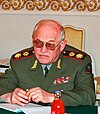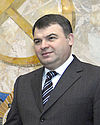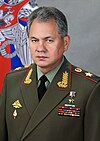| Minister of Defence of the Russian Federation | |
|---|---|
| Министр обороны Российской Федерации | |
 Flag of the Minister of Defence | |
| Style | "Comrade Minister of Defence" (military) "Mr. Minister" (international) |
| Member of | Government, Security Council, CIS Defense Ministers Council |
| Reports to | The President |
| Seat | Defense Ministry Building, Moscow |
| Precursor | Minister of Defence (Soviet Union) |
| Formation | 20 August 1991 |
| First holder | Konstantin Kobets |
| Deputy | First Deputy Minister of Defence |
| Website | Official website |
The Minister of Defence of the Russian Federation (Russian: Министр обороны Российской Федерации) is the minister responsible for the Russian Armed Forces. Marshal of Aviation Yevgeny Shaposhnikov was the last Minister of Defence of the Soviet Union. General Colonel Konstantin Kobets supported then President of the Russian Soviet Federative Socialist Republic Boris Yeltsin during the August coup of 1991. From 19 August until 9 September 1991, Konstantin Kobets was Defense Minister of the RSFSR, though there was no ministry.[1] This post was then abolished.
The first Minister of Defence of the Russian Federation was Boris Yeltsin, who appointed himself to the position by a decree of mid March 1992.[2]
In May 1992, President of Russia Boris Yeltsin appointed General of the Army Pavel Grachev to the post of Minister of Defence. Grachev's decision to side with Yeltsin in the Russian constitutional crisis of 1993, when the president called up tanks to shell the Russian White House to blast his opponents out of parliament, effectively deprived the Supreme Soviet of Russia of its nominal an opportunity[clarification needed] to overturn the president's authority. At least partly for that reason, Yeltsin retained his defence minister despite intense criticism of Grachev's management of the First Chechen War and the Russian military establishment in general. Finally, Yeltsin's victory in the first round of the 1996 Russian presidential election spurred Yeltsin to dismiss Grachev.[citation needed]
In March 2001, Sergei Ivanov, previously secretary of the Security Council of Russia, was appointed defence minister by President Vladimir Putin, becoming Russia's first non-uniformed civilian defence minister.[3] Putin called the personnel changes in Russia's security structures coinciding with Ivanov's appointment as defence minister "a step toward demilitarizing public life." Putin also stressed Ivanov's responsibility for overseeing military reform as defence minister. What Putin did not emphasise was Ivanov's long service within the KGB and FSB and his then rank of General-Lieutenant within the FSB. Such military and security agency associated men are known as siloviki.
As of 2002 there were four living Marshals of the Soviet Union. Such men are automatically Advisors to the Defence Minister. The Marshals alive at that time were Viktor Kulikov, Vasily Petrov, Sergei Sokolov, a former Minister of Defence of the Soviet Union, and Dmitri Yazov. Yazov was listed by the American analysts Scott and Scott in 2002 as a consultant to the (former 10th) Directorate for International Military Cooperation.[4]
Perhaps the first 'real' non-uniformed Defence Minister was Anatoliy Serdyukov, appointed in February 2007. Serdyukov was a former Tax Minister with little siloviki or military associations beyond his two years' military service.










